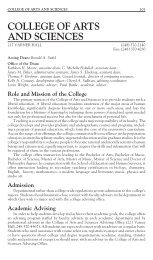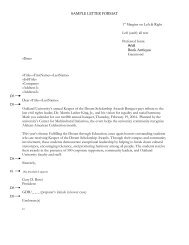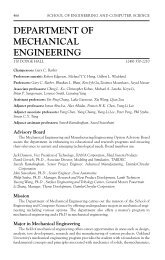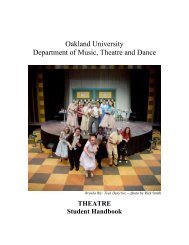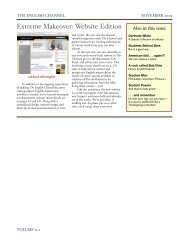MOM 2006 journal for pdf.pmd - University of Michigan-Flint
MOM 2006 journal for pdf.pmd - University of Michigan-Flint
MOM 2006 journal for pdf.pmd - University of Michigan-Flint
You also want an ePaper? Increase the reach of your titles
YUMPU automatically turns print PDFs into web optimized ePapers that Google loves.
The reader is thrust out <strong>of</strong> the memory when the man was “too boiled and shy/and poker-faced<br />
to make a pass” into his present state <strong>of</strong> despair (19-20). The promise <strong>of</strong> what the relationship<br />
might hold, as conveyed through the memory, is lost, and the implied war suggested through the<br />
images <strong>of</strong> nature in the beginning <strong>of</strong> the poem is confirmed.<br />
Now twelve years later, you turn your back.<br />
Sleepless, you hold<br />
your pillow to your hollows like a child;<br />
your old-fashioned tiradeloving,<br />
rapid, mercilessbreaks<br />
like the Atlantic Ocean on my head. (23-28)<br />
The hostility <strong>of</strong> the external environment in the beginning <strong>of</strong> the poem is explicitly stated in the<br />
return to the bedroom scene. The return to the present completes the movement <strong>of</strong> the poem,<br />
resulting in a revelation <strong>of</strong> the larger thematic significance that is the human experience.<br />
In addition to the artistic technique <strong>of</strong> the manipulation <strong>of</strong> time and realistic detail, Lowell<br />
<strong>of</strong>fers further support <strong>of</strong> perceived authenticity masking artistry through the management <strong>of</strong><br />
voice. Lowell presents a female first person speaker in “To Speak <strong>of</strong> Woe That Is in Marriage,”<br />
contradicting Middlebrook’s assertion that “a confessional poem contains the first-person<br />
speaker, “I”, and always seems to refer to a real person in whose actual life real episodes have<br />
occurred that cause actual pain, all represented in the poem” (Travisano 39-40). According to<br />
this definition <strong>of</strong> confessionalism, “To Speak <strong>of</strong> Woe That Is in Marriage” does not fit the criteria<br />
<strong>of</strong> a confessional poem. The “I” <strong>of</strong> the poem is clearly not Lowell, and the implied pain as a<br />
result <strong>of</strong> what is occurring in the poem does not belong to Lowell. While the subject <strong>of</strong> the poem<br />
may fit Middlebrook’s criteria <strong>for</strong> a confessional work, the use <strong>of</strong> a female speaker illustrates<br />
artistry in action as Lowell utilizes experimentation <strong>of</strong> voice to move away from the “public,<br />
prophetic stance” <strong>of</strong> earlier his writing (Hendley).<br />
‘To Speak <strong>of</strong> Woe That Is in Marriage” does not rely on the “incorporation <strong>of</strong> guilty personal<br />
detail <strong>for</strong> emotional effect” but rather provides details <strong>of</strong> a dysfunctional marriage in order to<br />
provide commentary on the destructive nature <strong>of</strong> personal relationships. Lowell’s examination <strong>of</strong><br />
domestic relationships through the voice <strong>of</strong> a woman is a technique <strong>of</strong> invention that allows him<br />
to safely uphold the idea that “men’s and women’s roles and prerogatives are radically different,”<br />
criticizing the reality <strong>of</strong> gender roles in the 1950’s and 1960’s (Hendley). The handling <strong>of</strong> voice<br />
serves as a medium <strong>for</strong> social commentary and allows Lowell to project his “illusion <strong>of</strong> honesty<br />
with seriousness and responsibility” (Yezzi).<br />
Although the work <strong>of</strong> Robert Lowell is <strong>of</strong>ten categorized as confessional, the realism<br />
contained within the poems is no more than an “artful simulation <strong>of</strong> reality” <strong>for</strong> the purpose <strong>of</strong><br />
aesthetic effect (Yezzi). Throughout the later poems <strong>of</strong> Robert Lowell, “’there’s a good deal <strong>of</strong><br />
tinkering with fact’,” resulting in an artistic feat that is <strong>of</strong>ten mistaken <strong>for</strong> a <strong>for</strong>m <strong>of</strong> disclosure<br />
but is really an incredible accomplishment <strong>of</strong> creativity and invention (Yezzi).<br />
Meeting <strong>of</strong> Minds <strong>2006</strong> 31




